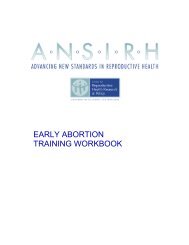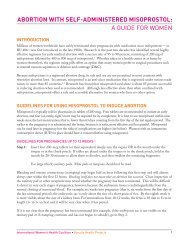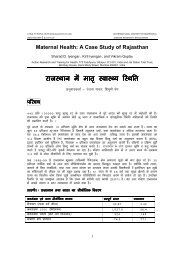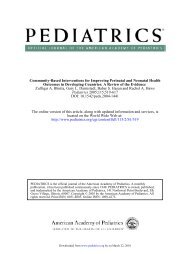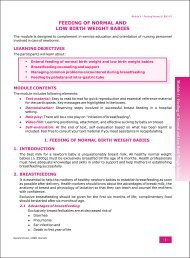- Page 2:
Collaborating and Supporting Organi
- Page 6:
Family PlanningA GLOBAL HANDBOOK FO
- Page 10:
ForewordsFrom the World Health Orga
- Page 14:
AcknowledgementsVera Zlidar, Ushma
- Page 18:
What’s New inThis Handbook?This n
- Page 22:
How to Obtain More Copiesof This Bo
- Page 26:
xii
- Page 30:
óóAs commonly used, about 8 pregn
- Page 34:
Facts About Combined Oral Contracep
- Page 38:
Medical Eligibility Criteria forCom
- Page 42:
Medical Eligibility Criteria for Co
- Page 46:
Providing Combined OralContraceptiv
- Page 50:
Woman’s situationNot breastfeedin
- Page 54:
Explaining How to Use1. Give pills
- Page 58:
“Come Back Any Time”: Reasons t
- Page 62:
óóóóóóóóóIf irregular blee
- Page 66:
óóóóóóóóóóóStarting trea
- Page 70:
Questions and Answers AboutCombined
- Page 74:
12. Can a woman safely take COCs th
- Page 78:
How Effective?Effectiveness depends
- Page 82:
Who Can and Cannot UseProgestin-Onl
- Page 86:
Using Clinical Judgment in Special
- Page 90:
Woman’s situationPartially breast
- Page 94:
Giving Advice on Side EffectsIMPORT
- Page 98:
Supporting the UserManaging Missed
- Page 102:
Managing Any ProblemsProblems Repor
- Page 106:
óóóóóóóBreast tendernessBrea
- Page 110:
Questions and Answers AboutProgesti
- Page 114:
10. Do POPs change women’s mood o
- Page 118:
What Pills Can Be Used as Emergency
- Page 122:
Correcting Misunderstandings (see a
- Page 126:
Dosing InformationFor specific prod
- Page 130:
When to Start Contraception After E
- Page 134:
Questions and Answers AboutEmergenc
- Page 140:
Hormoneand PillTypeCombined(estroge
- Page 144:
CHAPTER 4Progestin-OnlyInjectablesK
- Page 148:
Side Effects, Health Benefits, and
- Page 152:
New Formulation of DMPAA formulatio
- Page 156:
Medical Eligibility Criteria forPro
- Page 160:
Using Clinical Judgment in Special
- Page 164:
Woman’s situationFully or nearly
- Page 168:
Giving Advice on Side EffectsIMPORT
- Page 172:
Supporting the UserGive specificins
- Page 176:
óDiscuss why the client was late a
- Page 180:
New Problems That May Require Switc
- Page 184:
6. Do progestin-only injectables ma
- Page 188:
CHAPTER 5Monthly InjectablesKey Poi
- Page 192:
Side Effects, Health Benefits, and
- Page 196:
Medical Eligibility Criteria forMon
- Page 200:
8. Do you have or have you ever had
- Page 204:
Providing Monthly InjectablesWhen t
- Page 208:
Woman’s situationNo monthlybleedi
- Page 212:
6. Dispose of ó Do not recap, bend
- Page 216:
Managing Late InjectionsóóóóIf
- Page 220:
New Problems That May Require Switc
- Page 224:
5Monthly Injectables5. Should the d
- Page 228:
OnlyEssentialstheCHAPTER 6Combined
- Page 232:
Providing the Combined PatchExplain
- Page 236:
OnlyEssentialstheCHAPTER 7CombinedV
- Page 240:
Providing the CombinedVaginal RingE
- Page 244:
CHAPTER 8ImplantsKey Points for Pro
- Page 248:
Side Effects, Health Benefits, Heal
- Page 252:
Who Can and Cannot UseImplantsSafe
- Page 256:
6. Do you have or have you ever had
- Page 260:
Woman’s situationFully or nearly
- Page 264:
Giving Advice on Side EffectsIMPORT
- Page 268:
Removing ImplantsIMPORTANT: Provide
- Page 272:
“Come Back Any Time”: Reasons t
- Page 276:
óóóóóóóóóóóóóóóóTo
- Page 280:
óóóIn the early stages of ectopi
- Page 284:
3. Do implants cause cancer?No. Stu
- Page 288:
CHAPTER 9Copper-BearingIntrauterine
- Page 292:
Correcting Misunderstandings (see a
- Page 296:
Medical Eligibility Criteria forCop
- Page 300:
Screening Questions for Pelvic Exam
- Page 304:
2.3.Ask the woman to consider her o
- Page 308:
Woman’s situationFully or nearlyf
- Page 312:
Giving Advice on Side EffectsIMPORT
- Page 316:
Supporting the UserGiving Specific
- Page 320:
4.A routine pelvic examination at t
- Page 324:
Switching toVasectomyWhen to start
- Page 328:
óóóóóóPartner can feel IUD st
- Page 332:
óóIUD completely comes out (compl
- Page 336:
3. If a current IUD user has a sexu
- Page 340:
OnlyEssentialstheCHAPTER 10Levonorg
- Page 344:
Known Health BenefitsHelps protect
- Page 348:
Using Clinical Judgment in Special
- Page 352:
Woman’s situationPartially breast
- Page 356:
CHAPTER 11Female SterilizationKey P
- Page 360:
Correcting Misunderstandings (see a
- Page 364:
óSpecial means special arrangement
- Page 368:
óóóóóSevere lack of nutrition
- Page 372:
Ensuring Informed ChoiceIMPORTANT:
- Page 376:
Performing the Sterilization Proced
- Page 380:
Supporting the UserExplaining Self-
- Page 384:
óóSevere pain in lower abdomen (s
- Page 388:
5. Does a woman who has had a steri
- Page 392:
CHAPTER 12VasectomyKey Points for P
- Page 396:
Side Effects, Health Benefits, Heal
- Page 400:
Medical Eligibility Criteria forVas
- Page 404:
Providing VasectomyWhen to Perform
- Page 408:
Performing the Vasectomy ProcedureE
- Page 412:
“Come Back Any Time”: Reasons t
- Page 416:
Questions and Answers AboutVasectom
- Page 422:
11. Does vasectomy increase a man
- Page 426:
How Effective?Effectiveness depends
- Page 430:
Correcting Misunderstandings (see a
- Page 434:
Supporting the UserEnsure clientund
- Page 438:
Managing Any ProblemsProblems With
- Page 442:
Questions and Answers AboutMale Con
- Page 446:
8. Can a man put 2 or 3 condoms on
- Page 450:
How Effective?Effectiveness depends
- Page 454:
Providing Female CondomsWhen to Sta
- Page 458:
Supporting the UserEnsure clientund
- Page 462:
Managing Any ProblemsProblems With
- Page 466:
4. What is the best way to make sur
- Page 470:
How Effective?Effectiveness depends
- Page 474:
Providing SpermicidesWhen to Start
- Page 478:
How Effective?Effectiveness depends
- Page 482:
Medical Eligibility Criteria for Di
- Page 486:
Explaining How to Use the Diaphragm
- Page 490:
Tips for Users of Spermicides or th
- Page 494:
óóóóóBacterial vaginosis (abno
- Page 498:
6. Could a woman leave a diaphragm
- Page 502:
Side Effects, Health Benefits, and
- Page 506:
óWork primarily by helping a woman
- Page 510:
Who Can Use Calendar-BasedMethodsMe
- Page 514:
Explaining How to Use Calendar -Bas
- Page 518:
Who Can Use Symptoms-Based MethodsM
- Page 522:
Explaining How to Use Symptoms-Base
- Page 526:
Ovulation MethodIMPORTANT: If a wom
- Page 530:
Supporting the User“Come Back Any
- Page 534:
3. What is new about the newer fert
- Page 538:
Who Can and Cannot UseWithdrawalMed
- Page 542:
óWorks primarily by preventing the
- Page 546:
The Lactational Amenorrhea Method f
- Page 550:
When Can a Woman Use LAM?A breastfe
- Page 554:
Helping Continuing UsersHelping Cli
- Page 558:
266
- Page 562:
Provide Services with Care and Resp
- Page 566:
MenImportant Supporters, Important
- Page 570:
Women Near MenopauseA woman has rea
- Page 574:
Relieving Symptoms of MenopauseWome
- Page 578:
pain, and cervical cancer. Over tim
- Page 582:
More About HIV and AIDSóóóóHIV
- Page 586: óBacterial vaginosis and trichomon
- Page 590: Contraceptives for Clientswith STIs
- Page 594: Cervical CancerWhat Is Cervical Can
- Page 598: Questions and Answers AboutSexually
- Page 602: 10. Does using hormonal contracepti
- Page 606: óIf a woman has, or may have been
- Page 610: After ChildbirthóóCoordinate fami
- Page 614: Preventing Mother-to-Child Transmis
- Page 618: óóóóóSore or cracked nipplesIf
- Page 622: Help Women Obtain Family PlanningCo
- Page 626: Violence Against WomenEvery family
- Page 630: 4.5.óIf she wants to talk about he
- Page 634: InfertilityWhat Is Infertility?Infe
- Page 640: CHAPTER 24Family PlanningProvisionI
- Page 644: óóCheck the client’s understand
- Page 648: MethodMonthly andprogestin-onlyinje
- Page 652: Wear glovesDo pelvicexaminationsonl
- Page 656: Make Infection Prevention a HabitWi
- Page 660: Regularly (monthly or quarterly, de
- Page 664: APPENDIX AContraceptive Effectivene
- Page 668: Condition Description Signs and Sym
- Page 672: Cardiovascular DiseaseóóóóHigh
- Page 676: ConditionCombined oralcontraceptive
- Page 680: = Use the method= Do not use the me
- Page 684: = Use the method= Do not use the me
- Page 688:
= Use the method= Do not use the me
- Page 692:
hernia; postpartum uterine rupture
- Page 696:
Glossaryabscess A pocket of pus sur
- Page 700:
endometrial cancer Malignant (cance
- Page 704:
jaundice Abnormal yellowing of the
- Page 708:
scrotum The pouch of skin behind th
- Page 712:
Aabdominal bloating and discomfort.
- Page 716:
community-based distribution...317c
- Page 720:
genital warts...279, 284-285gloves.
- Page 724:
lubricants...274for female condoms.
- Page 728:
post-exposure prophylaxis...209, 28
- Page 732:
unexplained vaginal bleeding...40,
- Page 736:
MethodologyThis handbook, one of th
- Page 740:
p. 250 Institute for Reproductive H
- Page 744:
Comparing InjectablesCharacteristic
- Page 748:
Characteristic Male Condoms Female
- Page 752:
Correctly Using a Male Condom1. Use
- Page 756:
External AnatomyClitorisSensitive b
- Page 760:
Male Anatomyand How Contraceptives
- Page 764:
Identifying Migraine HeadachesFor w
- Page 768:
When she returns:óóIf she returns
- Page 772:
If You Miss PillsAlways take a pill



